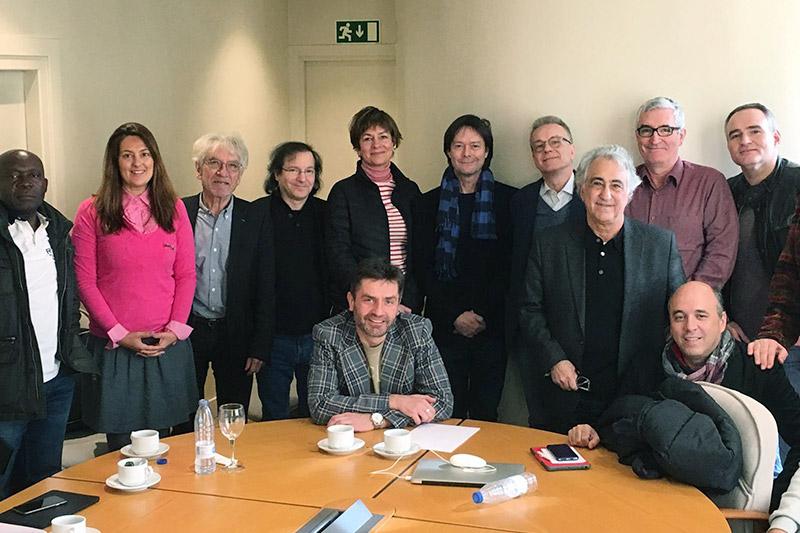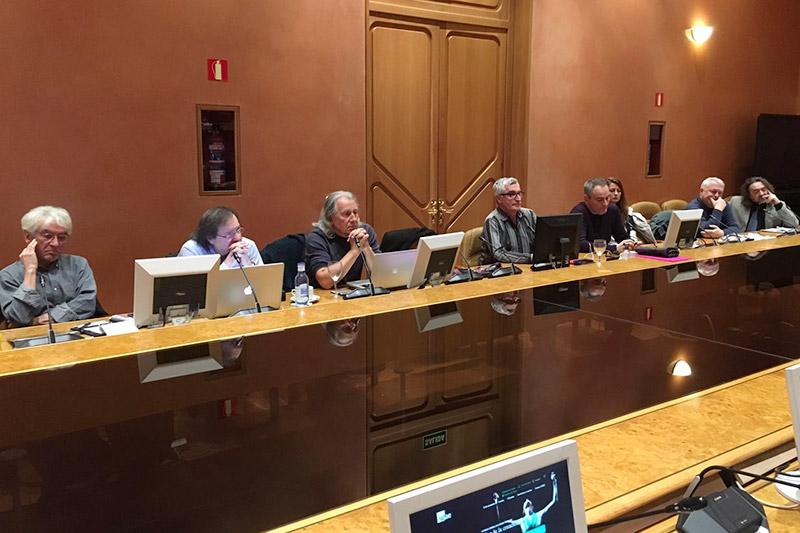CIAM Executive Committee Sets Out Strategic Direction in Defence of Music Authors

The International Council of Music Authors (CIAM) has identified three key strategic areas of focus for its work this year on promoting the rights of songwriters and composers.
At the strategy meeting held in Madrid, Spain on 18 January 2017, the council’s executive committee was joined by representatives from its global partners, experts and other observers for an open discussion on the complete music value chain. Amongst those attending were music creators Suzanne Combo and Nacho Vega from the International Artists Organisation, Javier Campillo from the Federación de Músicos Asociados, and Natalia Vergara from the Autores de Música Asociados. Spanish composers Luis Ivars, representing ECSA, and SGAE Vice President Javier Losada were also in attendance.
Safe Harbour and the Transfer of Value
The concept of safe harbour was originally developed to help the legitimate growth of internet businesses by making it easier to move data internationally. More recently however, the legislation’s provisions to protect Internet service providers from the consequences of their users’ actions has seen another economy evolve where the value of artistic work is transferred from the creator to these digital intermediaries.
This occurs due to a disconnect in the law. While it is of course illegal for users to share copyrighted artistic works (e.g. music) on platforms such as YouTube without a licence, there are inexplicably no issues with that platform’s owners then deriving huge advertising and data mining revenue from the same music or video stream. The value that is present in the artistic work and that would usually flow back to the right holder is thus transferred to the platform owner.
Safe harbour is a license to steal” – Eddie Schwarz, CIAM Vice-President.
CIAM intends to grow its position as an international lobbying group to protect creators against this important issue.
Blockchain
Blockchain is the technological revolution behind the emergence of Bitcoin as a currency. In its simplest form, the blockchain is a ledger of transactions that sits on all the computers within its network and keeps track of payments by registering and validating them. The information is encrypted and the ledger is not owned by any one person or organisation. Thus its transactions are truly peer-to-peer without the need for any intermediary.
This technology could have an enormous impact on the music industry. For creators, it might allow them to establish a direct connection with the consumers of their music, creating a two-way dialogue with their fans and followers. For music publishing, the revolution could be even greater with the potential for complex songwriting remuneration deals to be instantly and autonomously handled.
To investigate this, and following the input of the London Congress 2016, CIAM has formed a working group that will begin analysing the opportunities and challenges from the creator’s perspective. Of paramount importance here are the concepts of moral rights and ownership which will need to be thoroughly examined if an equitable economy is to evolve.
International Alliances
The third strategic area of focus returns to one of the council’s primary reasons for existing – to coordinate and represent the voice of music creators at a worldwide level. Following the formation of the Asia-Pacific Music Alliance in Beijing in November 2015, CIAM now has a global network of creators to help support its lobbying work.
With this most recent addition, the involvement of Japan, Australia, China, Korea and others was of crucial importance and the council is now working to increase its networking and cooperation to help all areas where music creators require support.

Other Items of Discussion
As part of the meetings in Madrid, a round-table discussion also raised other agenda items that were reviewed by the group. The news that CISAC has dedicated a specific budget to support the partner alliances was extremely well received as a mark of confidence by CISAC Board of Directors. A new appointment in its creator relations’ team also supported this view.
Creator contracts were discussed in light of the recent Duran Duran legal case and regarding the right for creators to recapture their work after a period. CIAM’s position that the recapture right available to US creators should be extended to all creators worldwide was first made clear at its Costa Rica Congress in 2013 and was reiterated here. The topic was tabled for future investigation and discussion.
Finally, the contribution of authors societies to CIAM was recognised and encouraged. While direct funding support is always needed, contributions in terms of expertise were highlighted as an excellent way for the council to achieve its long-term objective of becoming a powerful international lobbying group and bring about a sustainable economy for music creators, distributors and the public.
